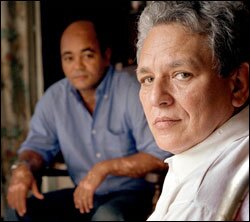The leader of a small group of independent Cuban teachers, who is also an open critic of President Fidel Castro, remained in jail this week after being arrested as part of a sweeping crackdown by the Cuban government against political opposition.

|
Roberto Miranda, right, was recently arrested in Havana, Cuba, as part of the government’s roundup of political dissidents. Lazaro Constantine Duran, behind, has been jailed before and is a member of a group headed by Miranda. |
Roberto Miranda, the president of the Association of Independent Teachers, is one of an estimated 75 political dissidents-many of them journalists-rounded up last month. Though the arrests have been overshadowed in the United States and elsewhere by the war in Iraq, the move has been condemned internationally.
Friends of Mr. Miranda said in telephone interviews this week that he has not been formally charged. The official explanation in the limited Cuban media coverage of the action has been that the dissidents had been conspiring with U.S. diplomats in Cuba against the island-nation’s Communist government.
State security forces also confiscated schoolbooks and other educational materials from Mr. Miranda’s house in Havana, where he tutored students in an after-school program.
Mr. Miranda spoke to Education Week in February about his hopes to someday see the country’s government relinquish its monopoly over Cuba’s school system and allow teachers, and students, to challenge the government openly without fear of reprisals. (“A Revolutionary Education,” March 5, 2003.)
Asked at that time about his group’s goals, the 56-year-old father of three said it wants to “let the world know about the politics here. If a student speaks out, they can’t continue studying for a career.”
Members of the Association of Independent Teachers also want to see the reopening of private Roman Catholic schools, which were abolished after the Castro-led revolution came to power in 1959.
In addition to operating school programs for dissident families across Cuba, Mr. Miranda’s organization has twice published lists of teachers who allegedly have been fired from their jobs for speaking out against the government or for leading students in activities that challenge official doctrine.
Twelve years ago, Mr. Miranda’s activism cost him his job as a junior high mathematics and geography teacher, said the Roberto Lamarrandi, the group’s vice president.
According to Mr. Lamarrandi, Mr. Miranda, who was arrested March 18, was visited for the first time since then by his wife early this week. “They were only able to talk about family issues,” Mr. Lamarrandi said. It was unclear to her this week how long her husband will be detained.
“We do not know what questions he was asked [by security forces],” Mr. Lamarrandi said.
Diplomats Curbed
A statement from the Cuban Ministry of Exterior Relations confirms the arrest of dozens of people. The statement contends that the detainees have been involved in subversive activities with U.S. diplomatic officials in Havana.
The lengthy statement outlines the government’s anger over meetings between dissidents and the head of the U.S. diplomatic team in Havana, James Cason.
“It shouldn’t come as a surprise to anyone that such traitorous acts at the service of a powerful foreign country that put in risk the security and interests of our heroic motherland could be guaranteed impunity,” the statement says.
Coinciding with the arrests, the Cuban government limited Mr. Cason’s movements around Cuba. In a political tit-for-tat, the U.S. government likewise limited the movement of Cuba’s representatives in this country. The United States and Cuba do not have formal diplomatic relations, but have representatives stationed in each other’s country.
Friends of Mr. Miranda say that the jailed educator and activist has never met Mr. Cason.
Among those also arrested were proponents of the Varela Project, a reform movement in Cuba calling for a citizens’ initiative on democratic change. The leader of that movement, Oswaldo Payá, was not arrested as part of the sweep.
“The United States is outraged,” U.S. Department of State spokesman Richard Boucher said of the arrests in a written statement. “These people have been arrested for simply speaking out, one of the most basic internationally recognized human rights.”
‘Prisoners of Conscience’
The European Union also has denounced the detentions, which could affect Cuba’s entrance into the Cotonou Agreement, an economic-assistance pact between the union and 78 African, Caribbean, and Pacific nations.
On March 26, the Presidency of the European Union in Brussels, Belgium, released a declaration stating, “The European Union condemns those arrests and demands that those persons, whom it considers prisoners of conscience, be released without delay.”
At the same time, U.S. Sen. Max Baucus, D-Mont., is standing behind a bill he introduced in February to lift this country’s 4-decade-old trade embargo against Cuba. On March 21, Sen. Baucus, the ranking minority member on the Senate Finance Committee, announced the formation of a bipartisan, 10-member working group on Cuban trade.
“It’s all the more reason to open the doors and lift the travel restrictions on U.S. travel to Cuba,” Laura Hayes, a spokeswoman for Mr. Baucus, said of the detentions. “Everyone knows that the goal is to help the Cuban people.”
Jaime Suchlicki, the director of the Institute for Cuban and Cuban-American Studies at the University of Miami, contends that Mr. Castro had planned the crackdown against any challenge to his power for some time, and is taking advantage of a war-distracted news media around the world.
“We cannot think of Castro being motivated by economic considerations,” Mr. Suchlicki argued. “In Cuba, political considerations always take precedence. If he were concerned that his people only had beans to eat, he would already have made changes.”
Meanwhile, Mr. Lamarrandi said that the dissident teachers would continue to hold classes in their homes across the country in after-school programs like the one Mr. Miranda had run.
Does he fear that he and others might be arrested as well? “One always knows that this regime can put anyone in jail,” he said. “The government does not care about international opinion when it puts someone in jail.”


